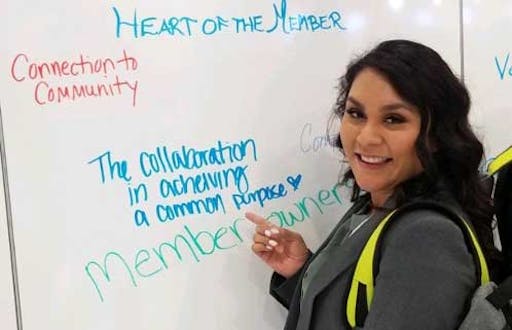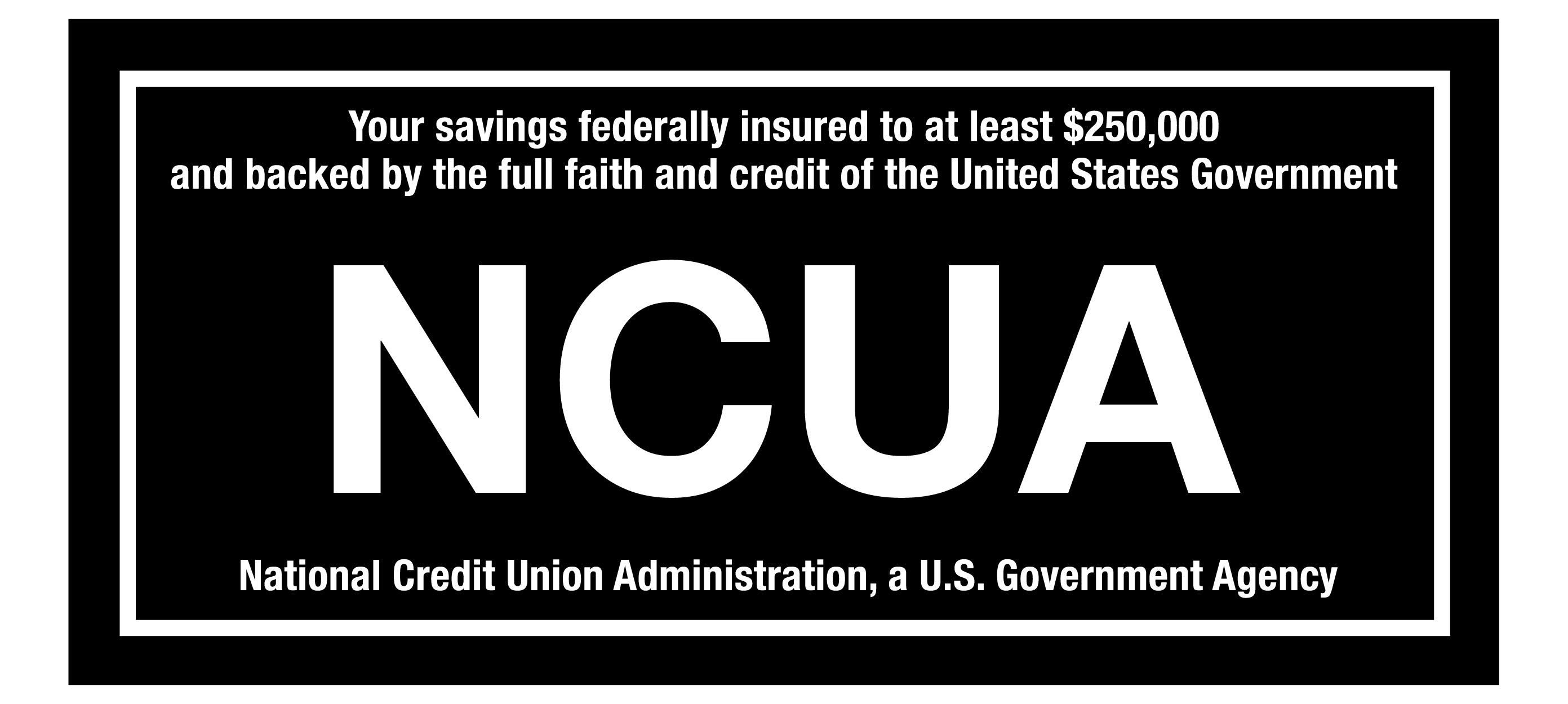Please be aware that mortgage and HELOC scheduled automated payments will be processed the evening of the scheduled date. The payment will be reflected on your account the following business day with the effective date that it was scheduled for.
Please be aware that mortgage and HELOC scheduled automated payments will be processed the evening of the scheduled date. The payment will be reflected on your account the following business day with the effective date that it was scheduled for.

At CapEd, we're proud of the work we do to support our local Education Community. That work is made possible by the talented and dedicated individuals that we employ, and one such individual is our Training and Development Specialist, Espy Poblano.
Espy is an active learner and innovation advocate. She is a member of CapEd's Unidos Committee, which organizes and informs our initiative to better serve the Hispanic community, as well as our Guiding Coalition, CapEd's committee dedicated to celebrating our employees for all that they do. Her work helps to improve training activities for new hires and to bolster a culture of awareness, inclusion, and empowerment at CapEd.
In February 2020, Espy participated as a "Crasher" at the CUNA Governmental Affairs Conference (GAC) in Washington D.C.
Crashing the GAC
The GAC is an annual event where credit union executives and board members from across the nation come together to effect change in their states. They do so by advocating to their legislators for changes to credit union law that they think will improve their communities.
The Crasher Program, made possible by CUNA and the Filene Cooperative Trust, affords credit union employees the opportunity to "crash" one of 14 different annual conferences at a reduced cost and with additional educational experiences. The program exposes "rising stars" in the CU industry to conversations happening at the executive level so they can expand their industry awareness and make valuable professional connections.
Espy was one of some 50 young professionals selected to receive the Crasher Scholarship to attend the GAC 2020. Her role was to be a learner and a disrupter. In the context of the Crasher experience, Espy describes a disrupter as a leader within a conversation. They are the person who says, "This is how we should be doing it, this is why, and I'll take the lead to figure out how we can make it happen." Espy definitely fills this role.
Espy's Conference Takeaways
Espy's GAC 2020 experience further inspired her to fulfill the credit union purpose: that we are not just another financial institution, but rather people helping people. She was most impressed by the level of advocacy among conference speakers and attendees for diversity, equity, and inclusion (DEI).
DEI is the newest credit union cooperative principal, introduced by CUNA Chairman, Maurice Smith, last year. Each Crasher course and event that Espy attended emphasized her role in advocating for DEI at her credit union.
"As a minority," Espy says, "I see a big importance in that. A lot of companies have the attitude of checking off boxes for diversity and inclusion, but what it's really about is making sure you see from all points of view and that everyone has a voice within the organization."
How can credit unions cultivate a culture of diversity and inclusion?
When credit unions are looking for ways to support and implement DEI, committees are a great place to start. For instance, groups of employees representing the Black, Latino, and LGBTQ+ communities are a great resource for an organization to ensure products and services are inclusive both in their benefits and the language used to promote them.
Another way to address diversity and inclusion is to make sure your CU's Board of Directors and C-suite include individuals from diverse backgrounds. These efforts help to promote an array of perspectives within a credit union at all levels of the organization.
Have the Hard Conversations
It can be uncomfortable talking about diversity because there may be guilt, fear, or shame associated with the examination of non-diverse practices, but when it comes to cultivating a company culture based on DEI, it's crucial to have those hard conversations.
As Espy states, "It's important to embrace the awkward tension, and be open, not just to listening, but having an open conversation where you bring up your points of view." In this way, you create space for, "a back-and-forth instead of disengaging due to discomfort."
For example, in a GAC 2020 Crasher session about DEI, Espy experienced a tough conversation about code switching, the concept of feeling pressure to change the way you express yourself to fit in. The primary definition of code switching relates to the practice of bilingual speakers changing their spoken language to be accepted in different social settings. The example brought up in Espy's group discussion was the pressure for people of color to change the color or texture of their hair to be seen as professional in the workplace.
"The conversation was tense," Espy said, "but each person was committed to listening, participating, and making changes with the knowledge they gained."
CapEd is currently working to better understand the needs of our Hispanic Community with our Unidos Committee initiative, but we know we can always do more. Our leadership is constantly seeking ways to involve more voices in the cooperative organization we are a part of, and we have taken each aspect of the GAC 2020 experience to heart to work toward more inclusive employee and member services.
Understand the Impact of Your Words
At CapEd, you've likely heard the words "Financial Literacy" used to promote understanding of financial concepts and empower individuals to make smart money decisions. At the GAC 2020, one of Espy's courses discussed a new perspective on this verbiage.
In this course, Espy learned that, "When we say Financial Literacy, we are unintentionally implying that the person is illiterate, which can be a turnoff for members. We [Crashers] were advised to say, Financial Wellness instead."
CapEd takes this kind of insight very seriously. Even small, purposeful adjustments in the way we speak can have a powerful effect on our ability to empower our community to be financially well. We're hopeful to continue to find better ways to communicate inclusively to improve our member experience.
Espy's Advice for Young Professionals
For anyone interested in attending conferences like the GAC in the future, even outside of the credit union industry, Espy has some helpful tips.
Know Your Elevator Pitch
On the first day of the GAC 2020, before heading out onto the conference floor, Espy and her fellow Crashers practiced what the business world calls Elevator Pitches. In this pitch, you need to know how to communicate succinctly who you are, what you do, why you're interested in connecting, and what you want to learn from the person you're talking to. Believe it or not, this should take less than thirty seconds to say.
The Crashers practiced their pitches on each other, but you can practice with your friends or family, your manager, or even a fellow employee you'd like to get to know better at your workplace.
Get Out of Your Comfort Zone
Espy considers herself a social individual, but even she had to do a pump-up pep talk before days at the GAC 2020. Most conference attendees were not only professionals in our industry but also of high importance and influence in their respective organizations, which can be intimidating. You'll find impressive connections at any conference, but the important thing to remember is that, no matter who you're talking to, we're all human and working toward similar goals. If you approach each conversation with the initiative to meet new people, understand new perspectives, and make a difference, you'll go a long way toward cultivating a rewarding career.
To prove this point, Espy learned that many past Crashers are now CEOs of companies or running their own start-ups because they reached out after networking events and kept making valuable connections throughout their careers. Some even work for CUNA and the Filene Institute today.
Maybe You're an Influencer
You'll never know where your strengths truly lie unless you apply for scholarships, attend events, meet people who do the work you want to do, and find out how they do it.
"Maybe you learn from your conversations with Managers or CEOs that your track isn't to be a Manager. Maybe you're an influencer," Espy said of her networking experience. "These conferences aren't just for C-suite and Managers." She continued, "The young professionals are the ones who will be taking over those positions in time, so this is the time for them to learn about what they can influence now to get there. I want to be that person that influences people to try it out."
What are Espy's next steps?
Espy sees herself "Crashing" other events, getting her Diversity and Equity Certification, participating in NWCUA's Emerging Leader Program, and continuing to research DEI.
"It's what we need to move forward," she says.
Espy's next goal is to become certified in Credit Union Development Education. The DE Program offers the opportunity to earn the CUDE™ designation, a title received by those who have been trained to understand the Credit Union Difference, member development issues, and emotional intelligence in an applied project setting. This designation helps participants understand the heart of issues affecting the members of our communities, such as homelessness, lack of food for children, and balancing daycare expenses with living expenses. In this way, DE Certified individuals are equipped to better serve credit union members by understanding the challenges they face every day.
CapEd is grateful for the initiative of employees like Espy who are taking steps to improve their understanding of DEI. Their drive helps support our Credit Union's dedication to cultivating and nurturing an inclusive workplace and an equitable banking environment in which our members can nurture their financial well-being.
How Can You Make A Difference?
There is always a way, large or small, to make a difference in your areas of influence:
- Advocate for the committees you want to see represented at your organization to ensure leadership knows what's most important to you.
- Join a Young Professionals working group to meet other driven individuals looking to network in our area or reach out to your fellow employees at work to get one started.
- And, no matter your position, attend networking events that interest you. The more people you know, the greater your collective perspective, and the more informed and empowered you will be to effect change where you see a need.
These experiences could help you to become a change leader in your workplace and beyond.
If you'd like to learn more about the Crasher Program, visit the Filene Cooperative Trust's website. If you have any questions for us, we'd love to hear from you.
